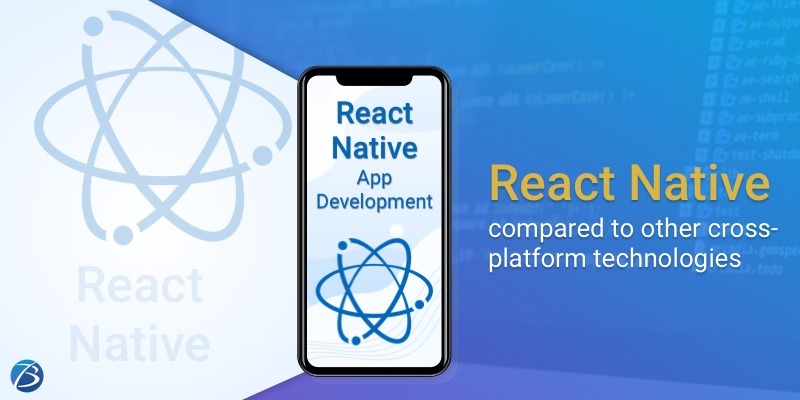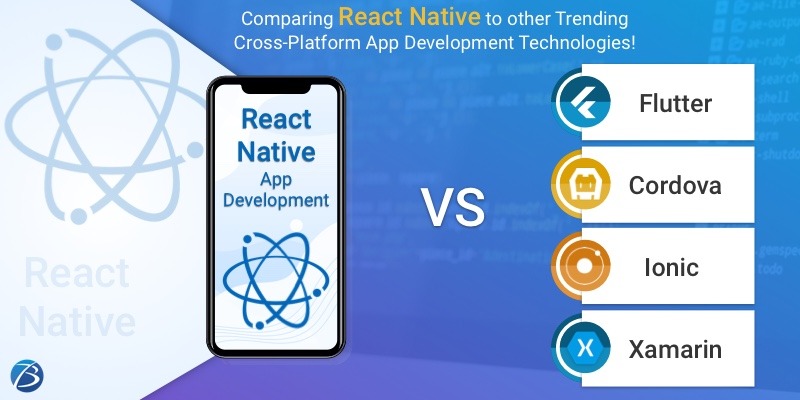ALL >> Technology,-Gadget-and-Science >> View Article
Comparing React Native To Other Trending Cross-platform App Development Technologies!

A survey conducted by Statista reveals; “Cross-platform technologies are used by approximately one-third of the mobile app developers as of 2020. Out of the contemporary cross-platform frameworks, 42% of software developers used React Native, 39% used Flutter, 18% used Cordova, 18% used Ionic and 14% used Xamarin”.
The aforesaid data indicates the popularity of React Native framework amongst the trending cross-platform frameworks. Yet, an app creator finds it difficult to select a framework for the next app development project; due to the availability of multiple options. So, despite React Native’s high adoption rate, businesses are curious to know about where this framework stands in comparison to its competitors – Flutter, Cordova, Ionic, and Xamarin. And, to be honest, it is a smart move to analyze all the available options and weigh the pros and cons of the most popular framework before narrowing down on a single option ...
... for app development.
This article compares React Native to the other cross-platform frameworks to provide clear visibility to entrepreneurs planning to invest in cross-platform app development. But, before proceeding further; take a quick look at the language and technology stacks used by each of the contemporary cross-platform frameworks.
React native and its Competitors: Programming Languages and Technology stacks used
React Native uses JavaScript, a most popular, dynamic, and high-level programming language. React Native blends the goodies of JavaScript and the web framework ReactJS. It also permits the writing of modules in Swift, Objective-C, or Java languages.
Flutter uses the Dart language. Dart can be compiled into the native code for enhancing the app’s performance. During build creation, Dart gets compiled into the code for ARM and x86 processors (Ahead of Time) and can also be translated into JavaScript as well as support dynamic compilation through the runtime (Just in Time).
Cordova enables one to use web technologies like CSS3, HTML5, and JavaScript for cross-platform app development, avoiding the usage of the native development language for each mobile platform. The applications are executed within wrappers meant for each platform and depend on the standard API bindings for accessing the data, sensors, and network status of each device.
Ionic makes use of web technologies such as JavaScript, CSS, and HTML5 for writing and running applications. The Cordova wrapper is needed for accessing the native platform controllers. Ionic’s core is written in Sass and the chief programming language is TypeScript. The usage of Typescript enables Ionic developers to detect as well as eliminate errors while code typing, and as such enhances the code quality. However, the usage of TypeScript is optional as the entire app can be written in plain JavaScript.
Xamarin uses the .NET framework and C#, a statically typed language; for all mobile platforms. A developer using C# with Xamarin can achieve the same outcome as delivered by Swift, Objective-C, or Java.
React Native Compared to the Contemporary Cross-Platform App Development Frameworks

React Native vs Flutter
• JavaScript is an easy-going and common programming language than the lesser-known Dart. Besides, Flutter development involves a steep learning curve. So, it’s easier for a React Native app development Company to find the necessary expertise and train professionals. Also, Flutter possesses richer and more organized documentation than React Native.
• React Native is easy to install and configure. Yarn and NodeJS would be required as Package managers when React-Native CLI is installed globally through the command line. Contrarily, Flutter installation needs additional effort – downloading the binary for the mobile platform, then adding path variable through the command line - that is complex as well as time-consuming.
• Owing to the JavaScript bridge, React Native can render native components for every platform and hence replicates the look and feel of native iOS and Android apps. Flutter uses built-in widgets to create native-like UI and fares better in case of complex UI creation. Additionally, Flutter apps display more consistency across various platforms.
• React Native utilizes a JavaScript bridge to interact with the native modules. The bridge tends to lag the UI because the bridge lowers rendering speed. Flutter, on the other hand, doesn’t need a bridge for this task, owing to its multiple in-built components along with frameworks like Skia engine, Cupertino, and Material Design. Hence, Flutter applications are more stable.
• React Native enjoys a stronger community backing which is an important advantage for an open-source framework. On the other hand community support for Flutter is smaller in comparison to React Native. Find more details about differences in this blog.
React Native vs Cordova
• React Native apps excel in performance while Cordova apps, being WebViews, are slower and lesser responsive.
• React Native offers a speedier interaction with core components and better native UX as it renders HTML as native UI in comparison to Cordova.
• Cordova offers more code reusability across various platforms.
• React Native provides a finer native user experience in comparison to Cordova
• Debugging is easier and simpler with React Native.
React Native vs Ionic
• While React Native follows the principle of “Learn once and write anywhere”; Ionic’s theory is “Write once and run anywhere”.
• The Ionic developers encounter an easier learning curve due to web technologies as compared to the React Native developers.
• React Native apps are much faster than Ionic apps and also possess elegant interfaces like native applications.
• React Native requires an emulator or real mobile device for code testing whereas the Ionic code can be tested using any browser.
React Native vs Xamarin
• Both are open-source platforms but Xamarin is free only for small firms and individuals.
• React Native offers some built-in components like buttons and text inputs that are partially adaptive. These components have to be rebuilt in case of advanced features. But, Xamarin. Forms provide a complete cross-platform toolkit having native UI components for Android and iOS that are compiled into platform-specified UI components.
• React Native boasts of better community support while Xamarin enjoys greater code reusability.
Bottomline
I hope the comparison of React Native and its contemporaries was enlightening and will assist the businesses planning to develop cross-platform apps to decide on the best cross-platform framework that suits their needs.
For technical assistance with any of these aforesaid frameworks; contact Biz4Solutions; a prominent and highly experienced mobile app development company.
The core technologies we offer:
The core technologies we offer:
Angular App development
Add Comment
Technology, Gadget and Science Articles
1. Guide To Understanding Led Road Flares And Led Safety FlaresAuthor: Andyxiong
2. Scraping Uae Grocery Chain Data
Author: Actowiz Solutions
3. What Are Document Management Services And How Do They Work?
Author: DocSmart Solutions
4. Web Scraping G2g For Real-time Price Changes & Trends
Author: Web Data Crawler
5. Rfid System Explained: Working, Benefits, And Real-world Business Applications
Author: AIDC Technologies
6. How Probe Monitoring And Storage Monitoring Are Transforming Environmental Compliance For Modern Facilities
Author: Chris Miller
7. Compliance-ready Erp With Dynamics 365 Business Central
Author: Ahil Waseem
8. Grocery Inflation Alert Dashboard – Oos & Price Spike Monitoring
Author: Food Data Scraper
9. Scrape Grocery Data Using Apis For Real-time Insights
Author: REAL DATA API
10. Multi-platform Tour Price Benchmarking For Smarter Pricing
Author: iwebdatascraping
11. Carrefour Food Delivery Data Scraping For Market Intelligence
Author: Retail Scrape
12. Best Buy Store-level Pricing Data Scraping From Us
Author: Web Data Crawler
13. Ultrapure Water Market 2025-2035: Trends, Technologies, And Industry Applications
Author: Shreya
14. Amazon Fresh Uk Grocery Deals & Offers Data Scraping Api
Author: Fooddatascrape
15. Europe Pelletized Fertilizer Market 2025–2035: Trends, Growth Drivers, And Future Outlook
Author: Shreya








